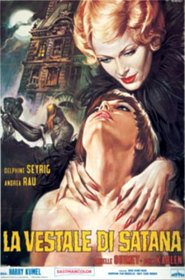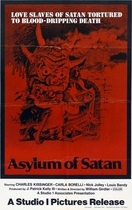Our editor-in-chief Nate Yapp is proud to have contributed to the new book Hidden Horror: A Celebration of 101 Underrated and Overlooked Fright Flicks, edited by Aaron Christensen. Another contributors include Anthony Timpone, B.J. Colangelo, Dave Alexander, Classic-Horror.com's own Robert C. Ring and John W. Bowen. Pick up a copy today from Amazon.com!
Daughters of Darkness (1971)
I wish I had some highly intelligent argument against Daughters of Darkness. The problem comes that on a certain level, the film succeeds. It is an unsettling, mind-screwing horror film, getting under your skin and making you uncomfortable. From the long discussions of death and torture, to the various sequences of the evil lesbians staring in at the blushing bride through the window, this movie just unsettles your stomach. But the failure comes that this horror is neither thought-provoking nor in any way truly enjoyable.
The film follows a newlywed couple, Valerie and Stefan (Danielle Ouimet and John Karlen), who travel to Belgium for their honeymoon. It is during the tourist 'off-season', so the couple enjoy a quiet time all alone in their hotel, with no one else around but the hotel clerk. That is until the mysterious Countess Bathory (Delphine Seyrig) and her secretary Ilona (Andrea Rau) arrive, wishing to rent the suite that the couple occupies. The Countess worms her way into the company of the couple, poisoning the mind of the husband to dark and dreary thoughts in order to drive a wedge in the marriage. When the Countess forces her secretary to seduce the husband, things go downhill fast for all involved, and it seems as if hope and good have no chance of triumph.
The film hinges on the Countess (who is based, in part, on the historical figure rumored to have bathed in the blood of virgins to retain her youth) and her antagonism, and this is where the film actually shines. Delphine Seyrig (The Day of the Jackal) plays the part as the 'vamp' style femme fatale, almost to the point of a Marlene Dietrich impersonation. She speaks her lines with a sort of sophisticated eloquence, even when describing some of the most terrible things. She definitely evokes a sense of twisted, evil aristocracy. Really, she does a stellar job of portraying the character. From her seeming seduction of the newlywed husband with thoughts of death and sex, to the more proper seduction of his wife, it's all just so... twisted. It's not enjoyable to watch, not even in the standard sort of way you can get glee from seeing Jason Voorhees murder a bunch of co-eds or Hannibal Lecter eat the face of a prison guard. But the Countess doesn't evoke these same sort of feelings. She's pretty, certainly, and sexually minded, but she operates on such a different mental plane that this is actually repulsive rather than attractive. But again, not in a way that polarizes you into enjoying her act this way. She's not a femme fatale in that sexy-dangerous sort of way. She's more like bunny-boiling crazy in an attractive package.
If we take the film as really focusing on the plight of the newlywed bride, Valerie, as her own world gets warped around her, we see a disturbing trend: She has nothing at all to look forward to. Her husband is a disturbing horn-dog with murder fantasies, who eventually becomes so obsessed with asserting control over his wife that he starts beating her with a belt. When she flees, attempting to escape everything, she is intercepted by the Countess... who is not in any way better than this woman's terrible husband. She falls from the control of a terrible man into the control of a terrible woman who drinks blood. There is no upside here, no liberation, no empowerment. It's just punishment. Even when, spoiler alert here, at the end of the film she is seen now exercising her power as a vampire alone, this is not a note of joy or interest, merely an afternote of 'And the cycle continues'. The abused becomes the abuser, and nothing is better. This is a counterpoint to the Countess, creating two visions of feminity. One has all the power and yet is sinister and destructive, the other has no power and can only react and take no action. These are two very different images, and both are highly insulting to women.
Seriously, this film is just all about abusing the female characters, or having them be abusive. The biggest example is the sequence where Stefan showers after cheating on his wife with Ilona. The lovers are both nude, and when he notices she doesn't want to enter the shower, he decides to bodily carry her in, despite her vehement screams and physical resistance. And as if this strange violation of her consent wasn't disturbing enough, it ends with her cutting her hand on a razor... and then being dropped on that razor to die. It's a statement against male abuse, certainly, but it's not just the males that are abusive. The Countess herself shows little to no regard for the well-being of her secretary, utilizing her as a tool to get what she truly wants. She is emotionally cold and controlling, whenever the secretary shows a smidgen of dissent she is barked at or dismissed. While not the obvious physical abuse that comes from the husband, this is still a clear example of emotional abuse. These are not isolated incidents, either. The husband repeatedly acts abusive to his wife and dismisses her whenever she attempts to assert any sort of strength. The film almost seems to be sending the message that abuse begets abuse, for in the end almost everyone is dead and the only one who isn't is preparing to suck the life out of some new innocent couple.
So here's the deal. The film has a bunch of aspects that work, but even the stuff that works eventually fails. The Countess is unsettling and evil and nasty, but you don't really like seeing her do what she does. The husband is an abusive dick, but you don't get catharsis from seeing him get his. The wife is nothing but a victim, until suddenly she becomes agent of destruction. There is just a lot of dissatisfaction and not enough entertainment to be brought out of these characters and elements. Somehow, this film is a cult favorite, but I just don't see why. If you really want to give it a try, maybe you'll see some little spark of life where I couldn't. But as far as I'm concerned, Daughters of Darkness is just simply not worth your time.
This review is part of Miscellaneous Foreign Horror Week, the last of five celebrations of international horror done for our Shocktober 2008 event.









I certainly agree that the
I certainly agree that the whole film makes uncomfortable watching. I am unclear why it was necessary to introduce "Mother" into the set but suspect that maybe it allowed the male producer to somehow distance himself from the idea that a "real man" could have such empathy with the countess (they two characters are drawn in parallel). Given its year of origin, it seems to me to be very reactionary in its portraial of female seeking empowerment or being in a position of power as corrupted and evil. The "lesbian" subtext that no doubt will make some people want to watch this is turned around to serve as part of a complete condemnation of women's rejection of male dominance. Not one for the feminists!
I thought this was a
I thought this was a fascinating and compelling film, and it's interesting to read a negative take on it. To me, this is essentially a story mocking the heterosexual marraige: the naive wife hoping for a fairytale ending is instead met with harsh realities as her new husband tries to assert power over her both emotionally and sexually. And we, the film viewers, get a glimpse of what is to come: the crushing realization of the husband that his marraige is a sham from the start, as he is already a "kept" boy of the older man he has led his wife to think is his mother. The juxtaposition of the power exchanges in this film is, I think, quite interesting (husband controls wife; husband's lover controls husband) and the only one with true power in the film is the countess, who manipulates them all. Her power is detached and timeless, as evidenced by the fact that her spirit, at the end of the film, takes over the wife's body, leading one to wonder if the countess was the first vampire or only one in a line of host bodies. All that said, I did find the murder of the countess's companion to be sad and its message unclear. I think we're led to believe that she was once in the place of the hapless wife: "rescued" from traditional, patriarchal marraige by a powerful lesbian, only to be used as a servant by her as well and eventually discarded when something newer and prettier came along.
But I think that this film also really has to be seen in the context of the lesbian-vampire genre. The countess is atypical: she's older, and while attractive is not set up as mere eye candy for the male viewer - she's never shown without clothes, an anomaly in the genre. Thus while other lesbian-vampire films are ultimately about the superiority of the male hero in vanquishing the lesbian vampire and reasserting his heterosexual power over the woman she has tried to steal away, Daughters of Darkness shows from the start that the husband's power is fleeting. The countess seems to toy with him, almost, gleefully bringing out his latent sadistic tendencies and allowing him a glimpse of power, only to murder him later with the same woman he had tried to control. And, again, the scene with "mother" on the phone shows quite clearly that the husband is himself firmly under the thumb of another man. Further, I do think it's worth noting that director Harry Kuemel was an academic and film historian as well, and he almost certainly was working very consciously with all of these motifs and intentionally trying to produce an alternative to the heteronormativity of the lesbian-vampire genre. I find it in no way to be a condemnation of the rejection of male dominance, though perhaps it could be said that it is a condemnation of the abuse of power across the board, transcending gender and sexual orientation.